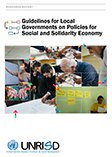Based on case studies of seven cities which have developed policies, programmes and institutions for the social and solidarity economy, the project identifies the key elements and good practices of such “SSE ecosystems”, and, on that basis, proposes guidelines that policy makers can use in their own cities to design, implement and assess public policies and institutional frameworks that support SSE organizations and enterprises.

Results and outputs
📋 Guidelines for Local Governments on Policies for Social and Solidarity Economy (2021)
Available in [English] [French] [Spanish]
The guidelines were publicly launched at a Special Session at the GSEF Global Virtual Forum on 19 October 2020. GSEF is an international association of local governments and civil society networks engaged in the promotion of the social economy as a means to achieve inclusive and sustainable local development.
📑 Seven in-depth case studies:
Public Policies Fostering the Social and Solidarity Economy in Barcelona (2016-2019)
—Rafael Chaves-Avila, Jordi Via-Llop, Jordi Garcia-Jané
Available in [
English] [
French] [
Spanish]
Public Policies for Social and Solidarity Economy : The Experience of the City of Dakar (Draft)
—Malick Diop, Aminata Samb Diop
Available in [
English] [
French] [
Spanish]
Creating an Enabling Environment for the Social and Solidarity Economy (SSE) through Public Policies in Durban, South Africa
—Susan Steinman
Available in [
English] [
French] [
Spanish]
Public Policy and Devolved Governance: Facilitating the Social and Solidarity Economy in the Liverpool City Region
—Helen Heap, Alan Southern and Matt Thompson
Available in [
English] [
French] [
Spanish]
Policies to Promote Social and Solidarity Economy: A Case Study of Mexico City
—Juan Jose Rojas Herrera, Roberto Canedo Villarreal
Available in [
English] [
French] [
Spanish]
Public Policies Enabling the Social and Solidarity Economy in the City of Montreal
—Marguerite Mendell, Nancy Neamtan and Hyuna Yi
Available in [
English] [
French] [
Spanish]
- Seoul (Republic of Korea)
Policy Systems and Measures for the Social Economy in Seoul
—Kil Soon Yoon, Sang Youn Lee
Available in [
English] [
French] [
Spanish]
The Research Issue in Context
As awareness about the role of social and solidarity economy (SSE) in facilitating inclusive and sustainable development grows, an increasing number of governments, both at national and subnational levels, are adopting policies and programmes that aim to support different types of SSE organizations and enterprises.
Many local governments are particularly interested in supporting the SSE in a context of growing demand for local-level public services and declining fiscal transfers from central governments. SSE is also gaining the interest of local policy makers thanks to its alignment with the holistic approach of the 2030 Agenda for Sustainable Development that requires integration of social, environmental and economic dimensions for implementation.
While the public policy environment plays a crucial role in setting the meso- and macro-level conditions under which SSE organizations and enterprises develop and operate, there are often difficulties associated with designing and implementing effective policy frameworks. SSE values and objectives may be misrepresented or circumscribed in policy; and features of SSE can be neglected or undermined when states get too heavily involved.
Clear, objective analysis, based on empirical evidence, of the characteristics of policies, programmes and institutional frameworks that are the most likely to deliver appropriate and effective results for the SSE sector would help policy decision makers, practitioners and SSE actors navigate these tensions in their local contexts, improving the prospects for inclusive and sustainable development outcomes.
Research Objectives and Methods
The project aims to generate a broader and deeper understanding of the policy and institutional frameworks that foster the development of robust SSE ecosystems at the subnational level, and, through the analysis of original empirical evidence from case studies of seven cities, propose guidelines that policy and decision makers can use to design and implement public policies that support SSE entities and organizations.
The project adopts a mixed approach of qualitative and quantitative methods in carrying out fieldwork in the seven case study cities, desk research and cross-case comparative analysis.
The following “ecosystem” elements will be explored in the research, and covered in the guidelines:
- Legal frameworks
- Supporting organizations
- Capacity building
- Access to markets and finance
- Communication and advocacy
- Research, data collection and knowledge exchange
Research Beneficiaries
The guidelines will help policy and decision makers achieve an objective, comprehensive mapping of the current public policy and institutional landscape that impacts the SSE, and map out future directions for its balanced and integrated development. The findings will be valuable to policy makers and their advisors at all levels—and at the subnational / local level in particular—tasked with the implementation of a social and solidarity economy or local sustainable development portfolio. They will also be of value to civil society and advocacy groups, practitioners and SSE actors aiming to ensure social justice and/or social and solidarity-based economic practices. And they will be useful to the research community in advancing their understanding of these issues.
Funding
The project is funded by the Global Social Economy Forum (GSEF)